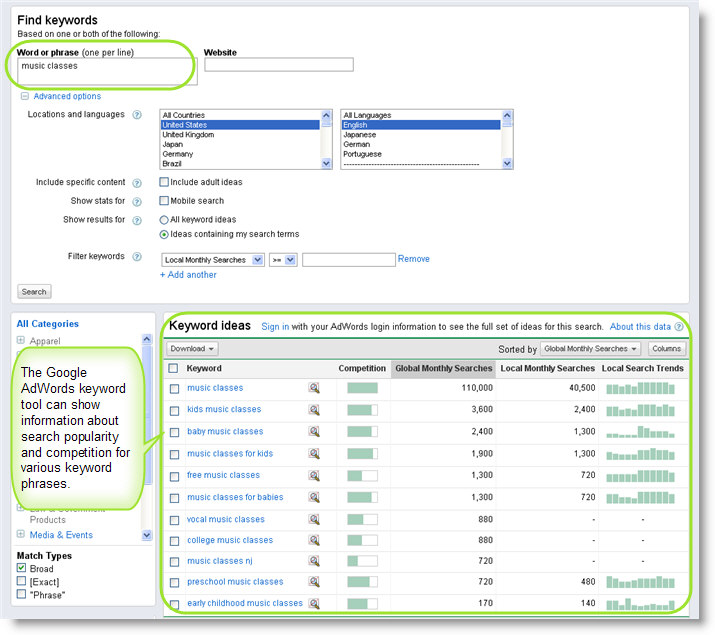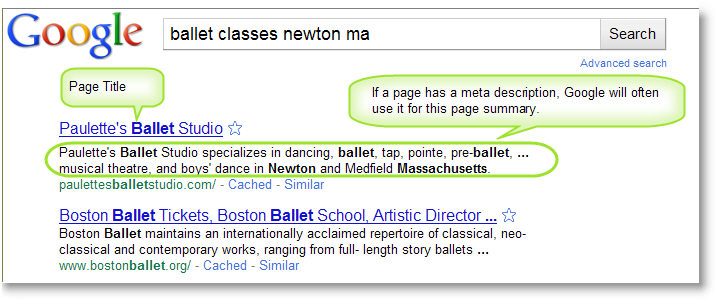Search Engine Optimization (SEO)
Getting the best possible placement in search engine results is a common request from Main Street Sites customers.
There are several factors to consider here:
- We'll assume Google is your target search engine (given that they get 80% of the traffic, that makes sense).
- The goal of SEO is to attract more visitors to your site using "organic search" techniques. You can also pursue paid placement in Google using pay-per-click (PPC) advertising. Please visit Google directly if you want to explore Google's Adwords program.
When it comes to SEO, there are 5 main things you need to think about (more or less in the order listed below):
1. Getting Noticed (Indexed)
The first thing you must do is to get your site indexed by Google. If Google doesn't know about your site, then your site won't show up in Google search results. A site is said to be "indexed" when Google knows about the pages on the site.
Google will not necessarily find your site automatically. The most common way for Google to find and index your site is for one of its "webcrawlers" to follow a link from another site to your site. For example, if Site A links to Site B and if Site A is already indexed by Google, then Google will probably find Site B eventually by following the link from Site A.
You can also submit your site to Google directly and ask to be indexed. Here is the link for manual submission to Google.
2. Keyword Research
Deciding which keywords are important to you is a critical step in improving your position in Google's results. When families are searching for classes, what are they searching for? If your site ranks well for terms they're not searching on, then it does you no good. The point of keyword research is to figure out what your customers are searching on. In a sense, you need to "get inside their head".
There are some free tools that can be helpful in this regard. One you might want to try is the free Google Adwords Keyword Tool. As shown in the screenshot below, the Adwords Keyword Tool can tell you how popular certain keyword phrases are. It can also tell your how competitive those phrases are. The more competitive they are, the harder it is, in general, to rank well for those phrases.

3. Optimizing Browser Titles and On Page Text
After completing your keyword research and deciding on the phrases you wish to target, it's important to update your site content so that it includes the targeted keywords. For example, if a certain page is targeting "music classses for kids in Springfield, Massachusetts", then you should make sure that those keywords appear on your page. For example, you would probably want to do the following:
- Include the keywords in the browser page title.
- Consider including the keywords in a page headline or elsewhere on the page (preferably near the top of the page).
- In some cases, it might make sense to repeat the keywords a few times on the page provided that the repetition is not unnatural.
Please note the following rules of thumb when optimizing your browser titles and page text:
- Your number one goal should be to create useful, relevant content.
- By definition, you can't optimize a web page for lots of keywords. You can however, create separate webpages and optimize each one for a different set of keywords.
- Stay focused. A keyword phrase like "music classes for kids in Springfield, Massachusetts" would probably be pretty good. On the other hand, an unfocused keyword phrase that tries to target everything will probably not help. For example a keyword phrase like "music classes, lessons and tutoring for kids, babies, toddlers, infants and young children in Springfield, Massachusetts as well as other cities in Hampden County" is not focused and would be of little value.
- Do not try to fool Google or "game the system" by stuffing keywords into pages in an unnatural way. Google has a whole team of people whose job is to figure out ways of defeating "SEO Spam". If you make sure that your text is natural and useful for a human reader, then you should not run into issues with Google.
4. Link Promotion
In order to get better search results, it's important to try to acquire links from other high-quality sites ("backlinks"). If Site A is linking to Site B, Google can detect that fact. If Site A is a popular, high-quality site, then Google will tend to interpret the link from Site A as a "vote" for Site B. The more "votes" (backlinks) your site has, the better it will tend to perform in search results.
Several important points are worth noting:
- The focus should by on acquiring links from relevant, high-quality sites. For example, if you are offering dance classes to children, you might try to acquire links from local newspapers, parent resource directories, local blogs, and so on.
- Links that include your keyword text are especially valuable. For example, link text that includes "music classes for kids" would be more valuable than a link that just says "click here".
- It is generally not a good idea to pay for links from other sites (although there can be exceptions).
It should also be noted that link promotion requires work and effort. Generally speaking, high-quality sites will only link to yours if you yourself have a quality site with something to offer. Even then, there are no guarantees. If you're serious about SEO, then link promotion is absolutely critical to the success of your SEO efforts. It also happens to be the hardest part.
5. Optimizing Search Engine Result Clickthroughs
Let's say you're fortunate enough to have your page listed at the top of the Google search results for a particular search term. Even then, your job is not over. You are still competing against many other listings on the same results page, all of which are vying for the web searcher's attention. How can you increase the probability that the searcher will click on your page rather than the result that is above or below you? The answer is generally twofold:
- Create meaningful page titles since those titles are used in the search result listings
- Consider creating unique, concise meta descriptions for your pages since Google often--but not always--uses those descriptions in page summaries in search result listings.

Final Points
Here are some other important considerations when plotting your SEO strategy:
- Don't forget your website! Make sure your website has high-quality, relevant content. Make sure your site is polished. Check spelling. Getting more visitors to your site will be of little value if it doesn't help move those visitors to action (i.e., register for a class, contact you, etc.). If your site doesn't project a professional and positive image, no amount of traffic will help.
- Create useful content. Don't try to spam the search engines. Google and the other search engines cannot be "gamed" for any period of time. Sites that try to fool Google are often penalized harshly.
- Understand that many other sites are competing against you. Don't expect that you'll make a few changes and then rocket automatically to the top of the search engine results.
- Be wary of "experts" who promise you they can get you top listings in search engines. Nobody can guarantee top placement in Google or any other search engine.
- There are no "magic formulas" or foolproof methods for ensuring top position in ranking results. Google changes their search methods frequently and those methods proprietary.
- Your time will be best spent on implementing commonsense techniques that have withstood the test of time like those listed above.